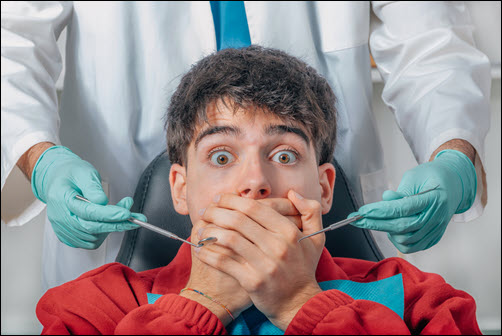Reducing Dental Anxiety During Dental Visits
Dental anxiety affects many people, making regular dental visits feel daunting. However, maintaining good oral health relies on consistent check-ups, and reducing anxiety around dental visits can make the experience more manageable and even positive. By taking a proactive approach, using relaxation techniques, and communicating with your dentist, you can ease your nerves and get the care you need.
Communicate Openly with Your Dentist
 A big part of reducing dental anxiety lies in open communication. Let your dentist know if you’re feeling nervous—they’re trained to support anxious patients and can adjust their approach to ensure you feel comfortable. Dentists can explain each step of the procedure in a calm, clear manner, so you know what to expect. Some offices also offer signals, like raising your hand, to let the dentist know if you need a moment to regroup, giving you more control over the experience.
A big part of reducing dental anxiety lies in open communication. Let your dentist know if you’re feeling nervous—they’re trained to support anxious patients and can adjust their approach to ensure you feel comfortable. Dentists can explain each step of the procedure in a calm, clear manner, so you know what to expect. Some offices also offer signals, like raising your hand, to let the dentist know if you need a moment to regroup, giving you more control over the experience.
Try Deep Breathing and Relaxation Techniques
When you feel anxious, your body often tenses up, and your breathing can become shallow, which increases stress. Practicing deep breathing before and during your visit helps calm your nervous system and eases tension. Take slow, deep breaths in through your nose, hold for a couple of seconds, and exhale slowly through your mouth. Focused breathing not only helps distract from your anxiety but also improves oxygen flow, naturally calming your mind and body.
Progressive muscle relaxation, where you tense and then release muscles from head to toe, can also help you feel more grounded. These relaxation techniques are simple but highly effective ways to reduce anxiety and stay focused on the present moment.
Use Distractions to Redirect Focus
Bring your smartphone and headphones, and create a calming playlist or listen to an engaging podcast or audiobook to divert your mind away from the sounds and sensations of the procedure. Focusing on something enjoyable helps reduce nervousness, letting you concentrate on something other than the dental work.
Consider Sedation Options
If your anxiety is particularly severe, ask your dentist about sedation options. Nitrous oxide, also known as “laughing gas,” is a mild sedative that helps you relax while keeping you fully conscious. Other options include oral sedatives or intravenous (IV) sedation for deeper relaxation, especially for longer or more complex procedures. Discussing these options with your dentist can give you peace of mind and make the experience far more comfortable.
Schedule Visits at a Convenient Time
 Avoid scheduling your appointment at times that add extra stress, like during work hours or immediately before an important event. Choose a time when you feel least rushed, such as a morning appointment when you’re more relaxed. Arriving early lets you settle in, practice breathing exercises, and adjust to the office environment.
Avoid scheduling your appointment at times that add extra stress, like during work hours or immediately before an important event. Choose a time when you feel least rushed, such as a morning appointment when you’re more relaxed. Arriving early lets you settle in, practice breathing exercises, and adjust to the office environment.
Celebrate Small Wins
After each visit, take a moment to acknowledge your accomplishment. Recognizing that you faced a source of anxiety and came through it successfully can reinforce positive feelings about dental visits. Over time, this approach can help you view dental care as a routine part of your self-care, reducing anxiety and building confidence.
By communicating openly, using relaxation techniques, and finding healthy distractions, you can make dental visits less stressful and more manageable. Taking small steps to reduce anxiety helps you stay on track with dental care, allowing you to enjoy the benefits of a healthy, confident smile. At Sauve Family Dentistry, we can help!




